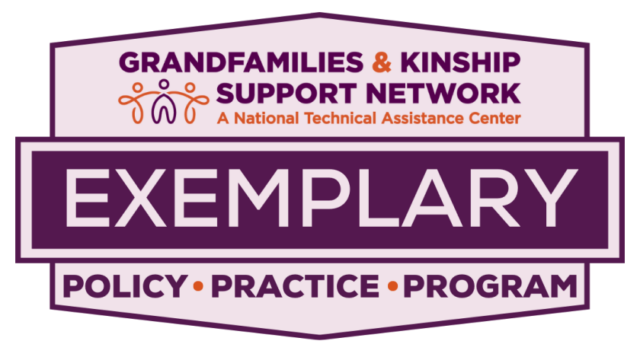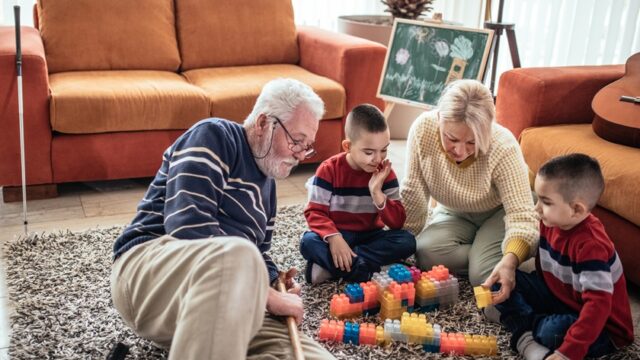
One of the goals of the Grandfamilies & Kinship Support Network: A National Technical Assistance Center (Network) is to designate and elevate exemplary kinship/grandfamilies practices and programs implemented by state, tribal, and territorial government agencies and nonprofit organizations. We are doing this work so kinship service providers can learn from each other and support more kinship families around the country.
Exemplary Practices
The Network opened a new opportunity to have kinship practices or policies designated as “Exemplary,” which closed on April 22, 2025. As of fall 2025, the Network is considering those applications.
Exemplary Programs
In 2022, the Network opened an opportunity to have programs designated as “Exemplary.” That process resulted in the following programs earning this designation:
Bridge Meadows Intergenerational Housing Community – Oregon
Colorado Kinnected – Colorado Department of Human Services
GRANDfamilies Kinship Care at Children’s Service Society of Utah
Grandparent & Close Relative Caregiver Subsidy Programs – District of Columbia
High Country Caregivers – North Carolina
Kids, Kin ‘n Caregivers – Virginia
Kinship Caregivers Connect – Ohio
Kinship Care Project of Atlanta Legal Aid Society, Inc.
Kinship Empowerment Program at DC KinCare Alliance
Kinship Navigator Program – Area Office on Aging of Northwestern Ohio
Montana Kinship Navigator Program and Kinship Connections of Wyoming
Project Healthy Grandparents – Georgia State University
The Kinship Program – Adoptive and Foster Families of Maine, Inc.
Washington State Kinship Program Services
Please click the links above for a detailed overview of each program, including its services, staffing, partners, and funding sources.
See this two-page document for a collection of quotes from clients of several of these organizations that earned our Exemplary Kinship Program designation. Keep up the great work!
About the Process
The Network determined exemplary kinship program status through a multi-step process that began with an open application promoted through our newsletter, social media, our partners, and this website (which launched in September 2022). The application period ran for four months, and an array of over 30 kinship programs from around the country submitted complete applications. Although the application was open to kinship practices and policies as well as kinship programs, only kinship programs applied. The Network plans to release another exemplary application opportunity during spring 2025 to capture exemplary practices and policies as well.
In late 2022, three Network staff members reviewed and scored the applications using a rubric informed by our evaluator, Child Trends. The rubric contained ten criteria: addressing strengths and needs of the population served; demonstrating success; engaging clients/target population in service offerings; promoting cross-system collaboration; engaging multiple partners; sustainability; continuous quality improvement; embedding the support of kinship families in agency values and principles; and collecting client demographic and satisfaction data.
Nineteen programs scored well across the criteria, and the Network arranged visits to each of those programs. A minimum of two Network representatives (consisting of at least one staff member and at least one subject matter expert or representative from a partner organization) visited the programs in summer/fall 2023 to conduct three separate group interviews with program staff, caregivers, and partners. If the visit findings and stakeholder interviews aligned with claims made in the application, the Network was pleased to designate the kinship program as exemplary.
The Network visited several programs that were not designated as exemplary due primarily to programmatic service delivery concerns raised by partners and clients. Network staff have offered to assist those programs. The Network is also providing intensive technical assistance to a cohort of community-based programs, mainly caregiver-led, that were not designated as exemplary due to issues around their own capacity, including funding sustainability.
Assistance from the Network is available free of charge to all kinship service programs, so please do not hesitate to reach out.
